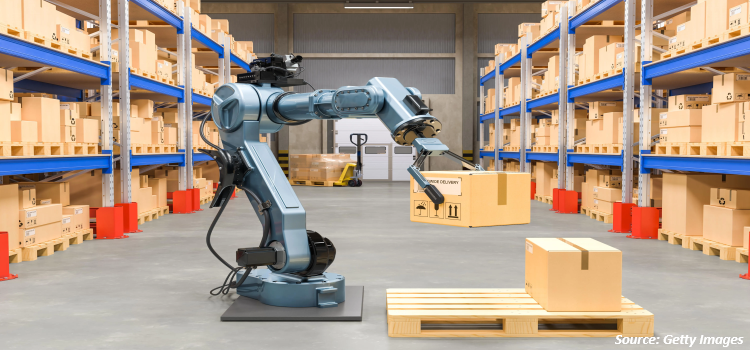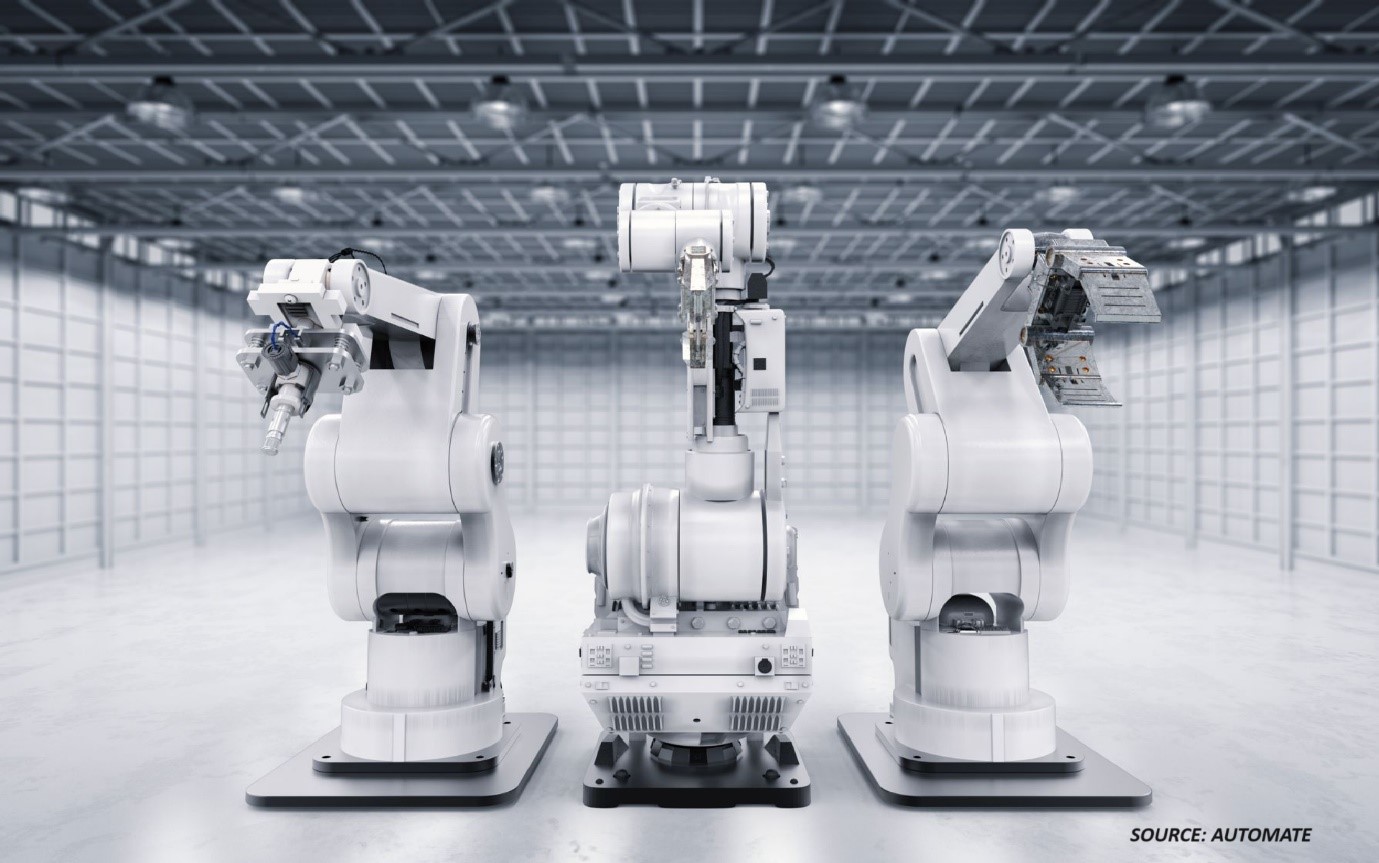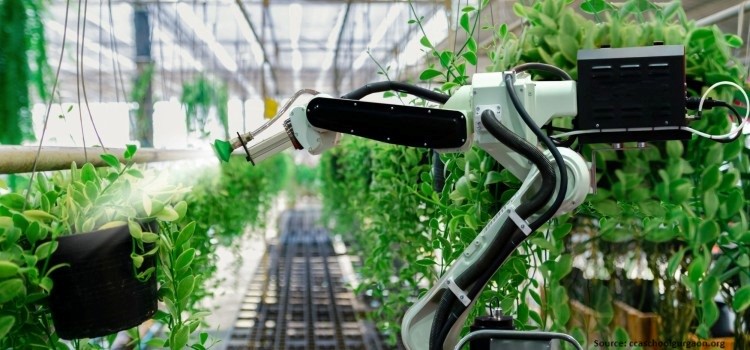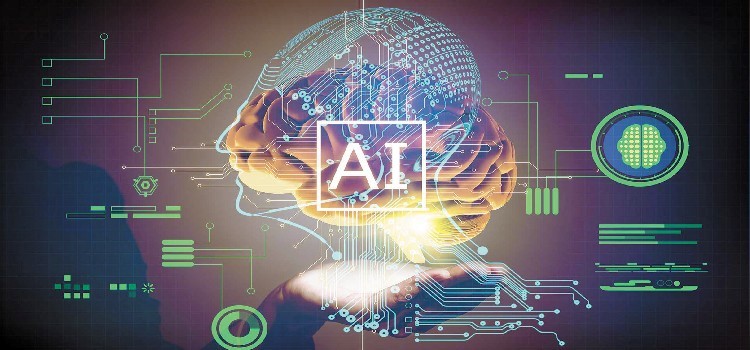Latest Technological Innovations Revolutionizing the Industrial Robot Industry
04-Jun-2024

Introduction
An industrial robot is a programmable machine designed to execute tasks with precision, speed, and reliability within industrial settings. Industrial robots are utilized across diverse industries, including automotive, electronics, aerospace, and pharmaceuticals. They increase productivity, improve quality, and raise cost efficiency. These machines can operate autonomously or under human supervision depending on the application. They are essential components of modern manufacturing and production processes.
In the industrial robotics industry, advancements continue to shape the global landscape, revolutionizing how businesses operate and manufacture. From fleet management to the integration of cutting-edge sensors and artificial intelligence (AI) technologies, the potential for innovation seems boundless. In this blog, we delve into five key areas driving the evolution of industrial robotics: fleet management, advanced sensors and 3D vision systems, AI and machine learning, energy efficiency and sustainability, and IoT integration. Each aspect represents a crucial facet of the ongoing transformation, offering insights into how modern robotics are reshaping industries worldwide.
Fleet management: Fleet management involves the centralized control and supervision of a group of robots operating within manufacturing or industrial environments. This encompasses various tasks, such as coordinating robot deployment, scheduling operations, monitoring performance, conducting maintenance, and optimizing overall efficiency across the entire robot fleet. The goal of fleet management in industrial robotics is to enhance productivity, efficiency, and reliability while minimizing downtime and operational costs.
Recently, Boston Dynamics introduced a new solution for robot fleet management called Orbit. This software utilizes AI technology, in conjunction with enhancements to the Spot robot, to provide greater control over robot operations. Orbit offers improved visibility into an organization's facility and provides additional flexibility for data analysis. By leveraging AI and integrating advanced capabilities into the Spot robot, Orbit aims to streamline fleet management processes, optimize performance, and enhance operational effectiveness in industrial settings.
Advanced Sensors and 3D Vision Systems: Manufacturers in the robotics industry are at the forefront of integrating increasingly sophisticated sensors and vision systems into their robotic platforms. These advancements are fundamentally altering the capabilities of industrial robots, empowering them to perceive and interact with their environments with unparalleled precision and adaptability.
A notable innovation in this realm comes from Omron Corporation, which introduced the FH-SMD Series 3D Vision Sensor. This groundbreaking technology represents a significant leap forward in sensor design and functionality. This not only streamlines the robot setup process but also conserves valuable space within manufacturing facilities.
The versatility of the FH-SMD Series extends beyond its ease of integration. Its design allows for flexible repositioning to alter viewpoints. This, in turn, enables robots to adapt to varying work environments and optimize part recognition. By minimizing blind spots and ensuring dependable detection, this sensor enhances the overall efficiency and reliability of robotic operations.
Moreover, the FH-SMD Series boasts newly developed 3D measurement technology that enables rapid part detection in approximately 0.4 seconds, regardless of the part's shape or position. This remarkable speed and accuracy represent a significant advancement in efficiency and versatility. It helps robots equipped with this sensor to tackle intricate tasks with unprecedented speed and precision.
In essence, the integration of advanced sensors and vision systems into industrial robots, exemplified by the FH-SMD Series 3D Vision Sensor, is revolutionizing the capabilities of robotic systems. By enhancing accuracy, object recognition capabilities, and overall performance, these technologies are driving the evolution of robotics and unlocking new possibilities for automation in manufacturing and beyond.
AI and Machine Learning: AI and machine learning are playing increasingly vital roles, particularly in predictive maintenance, quality control, and autonomous decision-making tasks. AI algorithms empower robots to learn from data and continually enhance their performance. Teradyne Robotics, the parent company of Universal Robots (UR) and Mobile Industrial Robots (MiR), is collaborating with Nvidia to integrate AI capabilities into industrial robots.
At a recent event, Teradyne announced the launch of a groundbreaking AI-powered solution for pallet handling: the MiR1200 Pallet Jack. This innovative Pallet Jack utilizes AI-enabled pallet detection, leveraging the processing power of the Nvidia Jetson AGX Orin module. By harnessing advanced 3D vision technology, it can accurately identify, pick up, and deliver pallets with unparalleled precision, even in dynamic and complex environments. This integration of AI into industrial robotics represents a significant leap forward. It promises improved efficiency and adaptability in warehouse and manufacturing operations.
Energy Efficiency and Sustainability: There is a growing emphasis on developing energy-efficient and sustainable robotic solutions. Manufacturers are designing robots with improved energy management systems and using eco-friendly materials to reduce environmental impact. ABB Robotics is expanding its large robot range with four new models and 22 variants.
This range offers more choice increased coverage and greater performance. The next-generation models include the IRB 6710, IRB 6720, and others. They are suitable for payloads ranging from 150 kg to 310 kg, with a reach from 2.5 m to 3.2 m. It offers customers greater choice and significant performance and energy efficiency improvements.
The improved energy efficiency is driven by ABB’s OmniCoreTM controller and a lighter robot design leading to energy savings of up to 20%. OmniCore also offers high motion control accuracy. Featuring ABB’s TrueMove and QuickMove motion control technology, robots can achieve class-leading repeatability with a minimum of 0.03 mm deviation. These capabilities make the new series of robots ideal for complex tasks, such as spot welding, laser welding, screwdriving, and riveting. This, in turn, allows automotive manufacturers to achieve high-quality assembly.
Internet of Things (IoT) Integration: The integration of industrial robots with the Internet of Things (IoT) is catalyzing a transformative shift toward enhanced connectivity and data-driven insights in manufacturing. Connected robots enable seamless remote monitoring, control, and real-time analysis of production processes. This, in turn, unlocks unprecedented levels of operational visibility and efficiency. By harnessing IoT technologies, manufacturers can access actionable insights into robot performance, productivity trends, and maintenance requirements.
This fosters a culture of continuous improvement and optimization. NEXCOM stands at the forefront of this revolution, providing a comprehensive suite of IoT devices tailored for automation systems. From industrial robot controllers to AI-powered computers designed explicitly for robots, NEXCOM empowers manufacturers to leverage the full potential of IoT integration for heightened competitiveness and innovation in the Industry 4.0.
Conclusion:
As the demand for efficiency, precision, and sustainability in manufacturing intensifies, the role of industrial robotics becomes increasingly indispensable. According to Next Move Strategy Consulting, the industrial robot market was valued at USD 39.53 billion in 2023, and is predicted to reach USD 88.55 billion by 2030, with a CAGR of 12.4% from 2024 to 2030. From the centralized control of robot fleets to the seamless integration of advanced sensors and AI algorithms, the possibilities for enhancing productivity and driving innovation are vast.
Moreover, the convergence of IoT with robotics heralds a new era of connectivity and data-driven insights, propelling industries into the realm of Industry 4.0. As we continue to push the boundaries with technological advancements, industrial robotics will remain at the forefront of driving progress, reshaping industries, and unlocking new possibilities for the future of manufacturing.
About the Author
 Sikha Haritwal is a researcher with more than 3 years of experience. She has been keeping a close eye on several industry verticals, including Banking, Financial Services, and Insurance (BFSI), personal care products, and consumer electronics. She has avid interest in writing news articles and hopes to use blog as a platform to share her knowledge with others. When she is not following industry updates and trends, she spends her time reading, writing poetry, cooking, and photography. The author can be reached at sikha.haritwal@nextmsc.com
Sikha Haritwal is a researcher with more than 3 years of experience. She has been keeping a close eye on several industry verticals, including Banking, Financial Services, and Insurance (BFSI), personal care products, and consumer electronics. She has avid interest in writing news articles and hopes to use blog as a platform to share her knowledge with others. When she is not following industry updates and trends, she spends her time reading, writing poetry, cooking, and photography. The author can be reached at sikha.haritwal@nextmsc.com
Add Comment
Related Blogs
How Abb, Basler, and Teledyne Are Shaping the Future of Vision-Guided Robotics Industry
The vision-guided robots market is witnessing robust growth,...
Leading Companies Revolutionizing the Agriculture Robots Market
The Agriculture Robots Market, valued at USD 8.78 billion in 2023, is set to sur...
The Top 10 Companies Shaping the Global Explainable AI Landscape
As reported by Next Move Strategy Consulting the global explainable AI market wa...










